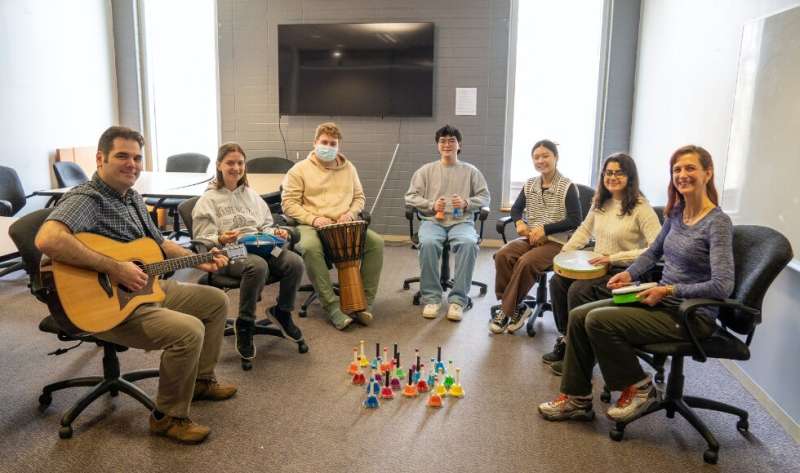Credit: McMaster University
Music therapy reduces stress and anxiety and can be as effective as traditional talk therapy, a new study finds.
Rachael Finnerty, a Ph.D. student in McMaster's Psychology, Neuroscience & Behavior department, studied undergraduate students who received online group music therapy in the early months of the COVID-19 pandemic as a way of coping with their stress and anxiety.
The study of 85 students measured stress levels using cortisol in participants' hair samples.
The group that did not receive therapy had significantly higher stress levels compared to the groups who received music or verbal therapy. Both therapies were equally effective in reducing anxiety levels after each session.
"The aim of bringing music therapy to campus is not only to reduce the number of students experiencing a mental health crisis, but to reduce the negative stigma associated with reaching out for help—particularly from a therapist," says Finnerty, who works under the supervision of Laurel Trainor, director of the McMaster Institute for Music and the Mind.
"People have positive associations with music which allows them to freely express themselves in a group setting. This reduces the barrier to getting help and potentially attracts students who would otherwise not participate in traditional therapy."
Results of the online group music therapy study are scheduled to be published in Frontiers in Psychiatry
With the easing of COVID-19 restrictions, music therapy is now offered in person each week in the McMaster University Student Center. Data from these sessions is still being collected.
Finnerty, who has worked as a music therapist for more than 20 years, is a long-standing advocate for music therapy and for mental health. She introduced two music therapy courses to the university in 2010 and continues to teach the popular Introduction to Music Therapy course, which has some of the highest attendance numbers at McMaster.
More information: Rachael Finnerty, Sean McWeeny and Laurel J. Trainor, Online Group Music Therapy: Proactive Management of Undergraduate Students' Stress and Anxiety, Frontiers in Psychiatry (2023). DOI: 10.3389/fpsyt.2023.1183311. www.frontiersin.org/articles/1 … 023.1183311/abstract
Provided by McMaster University
























